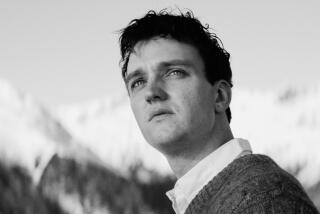MOVIE REVIEW : ‘ALPINE FIRE’ STIRS FAMILY PASSIONS
- Share via
One advantage of working outside a major film industry, one that writer-director Fredi M. Murer definitely capitalizes on in “Alpine Fire” (Beverly Center Cineplex), is that the lack of a strong studio system often forces you to point your cameras at your own landscapes and construct stories around your own people.
In this moody and exceptional Swiss film--one whose raw subject is counterbalanced by excellent scenes and performances--the landscape is one of the stars. These Alpine vistas are both spectacular and mundane. There’s a breathtakingly picturesque quality to the views of the snow-mantled mountains and a believably dirty, everyday grip to the farmland close-ups: scrappy pigsties, windy fields, weathered wood. These are the same Swiss mountain slopes we often starrily envision in postcard storybook fantasies as a backdrop for pigtailed Heidis, yodeling skiers and quaint octogenarians with snowy beards. Yet what we see here, like the rural India of Satyajit Ray or the Provence of Marcel Pagnol, is rendered with stimulating detail--glowingly real, at times even uncomfortably so.
Murer sets his film, based on his own original novel, on these distant Alpine slopes, among families so isolated they have to visit each other by ski lifts. That isolation becomes the drive shaft of the drama. The family we see here--the parents, a son and daughter--become enmeshed in tragedy precisely because of their lack of contact with the outside world. Sealed off from urban civilization, even from the neighbors and relatives who live near them, they are forced into a series of increasingly bizarre clashes and interconnections. The son (Thomas Nock), a 15-year-old deaf-mute, overprotected by the entire family, becomes unmanageable at puberty. He provokes his father (Rolf Illig) to rage, then escapes onto the mountainside, sublimating his sexuality in fairy-tale rock-pinnacle constructions. Eventually, his older sister, Belli (Johanna Lier)--also his major protector and only teacher--seeks him out, igniting a fuse that races darkly toward incest, violence and possible death.
The story is constructed like a fable embedded in a documentary, a poem caught in a newsreel, in a style that puts a premium on immediacy and severely limits dialogue and exposition. We are plunged into the daily life of the family, their visits with the grandparents, their daily quarrels and reconciliations, the connubial whispers that echo and re-echo and, finally, into the little cycle of desire and madness that closes the larger cycle.
Murer is, in fact, a veteran documentarian, a specialist in Swiss rural culture with more than 20 films to his credit. He grew up on Lake Lucerne, not far from this film’s location, and he fixes his gaze where a native would: toward the ground, toward the houses and the minutiae of everyday life, less often toward the towering mountains and clouds beyond--the overpowering vistas that are here taken for granted.
All this rich topography is caught so well by cameraman Pio Corradi that it comes to seem hauntingly familiar, even as the story plummets into almost mad, Gothic depths, as the cast--Nock, Lier and Illig as well as Dorothea Moritz as the mother--begin to collide against each other like beans in a shaking bowl. Robert Flaherty and Luis Bunuel are apparently Murer’s favorite film makers, and there’s a bit of each in his style: Flaherty’s close, loving, non-judgmental focus on reality, Bunuel’s mocking, clear-eyed leveling of perversity and degradation.
Yet--for us, and for any audience willing to succumb to the film’s languorous rhythm--it’s those landscapes, and the unstressed but deep lyric element, that will predominate. In the mystical, bleak climax of “Alpine Fire” (rated R for sex and nudity), the human beings seem, eerily, to have finally become immersed in nature, indivisible from it--even as nature, apparently, prepares to cast them out forever.
More to Read
Only good movies
Get the Indie Focus newsletter, Mark Olsen's weekly guide to the world of cinema.
You may occasionally receive promotional content from the Los Angeles Times.









